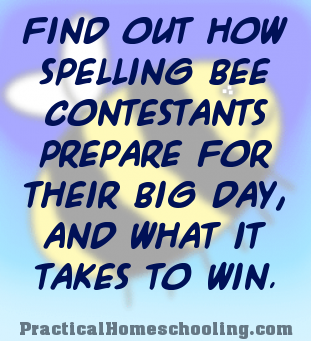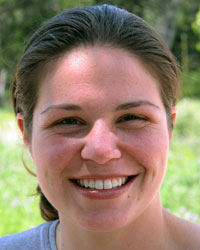How to "Bee" a Spelling Success
By Sarah Hensley
Printed in Practical Homeschooling #58, 2004.
 Find out how Spelling Bee contestants prepare for their big day, and what it takes to win.
Find out how Spelling Bee contestants prepare for their big day, and what it takes to win.

|
 |
 It’s never too early to start your son or daughter in the direction of spelling success! And, the ultimate in spelling success is probably participation in the National Spelling Bee sponsored by Scripps Howard.
It’s never too early to start your son or daughter in the direction of spelling success! And, the ultimate in spelling success is probably participation in the National Spelling Bee sponsored by Scripps Howard.
In the early 90’s there were only one or two homeschool students at most in the National Spelling Bee each year. By the 1996 competition, there were fourteen. In 2003, the number of homeschoolers at the National level jumped to thirty-one! These bright and determined students were not only winning their local bees to make it to the Nationals; homeschool students were and are winning the National title. We are proud to salute the following homeschooled National Spelling Champions: Sean Conley (2001), Georgie Thampy (2000), and the first homeschool National Champion, Rebecca Sealfon (1997).
If you have a homeschool student interested in competitive spelling, there are a few things you should know about spelling bee participation, the rules, and how to study.
How Do I Participate?
To become involved, contact the local sponsor who organizes the spelling bee in your area and sends the winner to The National Spelling Bee. Each sponsor signs a contract agreeing to sponsor a spelling bee for all schools in a given area, including, public, parochial, private, and home. Your sponsoring newspaper will direct you to a homeschool association in your area offering their own “School Bee” or to a local school that will invite you to participate in their bee. Participation is open to students up to the 8th grade who are not older than 15.
If you don’t know who your sponsor is, a list of participants and the newspapers that they represent is typically posted at www.spellingbee.com, or you can contact Scripps Howard from the same website.
The next thing to do, if you’re planning ahead, is to attend a spelling bee. Take your student or her to a bee to observe the mechanics and the level of expertise of the spellers. This is an invaluable learning experience and will often inspire your student to want to compete at the higher rungs of the competition ladder.
Another tool for inspiration is the documentary, Spellbound, which follows the lives of several spellers who worked to hone their skills and participate in the National Bee. This incredible documentary from director Jeff Blitz and producer Sean Welch is a must-see for all “wannabe” spellers.
Getting prepared for your own bee includes purchasing a study booklet, Paideia, from your sponsoring newspaper. The booklet lists 3800+ words, categorized as Beginning, Intermediate, and Advanced. The list is broken down by topics, such as “War and Peace,” “Chemistry,” “Famous Words,” etc. Each category contains words from each difficulty level. Start your child with only the Beginning words before you advance to the Intermediate level. Many of the Intermediate words are very difficult for young students. The last step is to learn the Advanced words, many of which are esoteric words which your speller has not encountered in his or her reading, and may not ever encounter again. This list includes so many words that your speller may not master the entire list. Do not let this concern you just yet. Your child’s first bee most likely will declare a winner without ever going to very difficult words.
If your speller wins, he or she will advance to the next level of bee competition: a school district bee, a homeschool district bee, a county bee, or the area bee that designates a student for the National Spelling Bee in Washington. Your sponsoring newspaper will know the regimen for advancing.
During a bee, the pronouncer initially only says the word to be spelled. Coach your speller to ask questions. A serious speller will ask for parts of speech, definitions, and alternate pronunciations to be certain that he or she is thinking of the right word. If the word is unfamiliar to the speller, the next items to request are other definitions and parts of speech and the word’s use in a sentence. The last possibility to trigger a memory of the word is to ask for its origin. For the speller that has studied etymology, this can be extremely helpful. For instance, if the word is derived from, let’s say Japanese, the spelling will be pretty predictable as the sound translation follows clear-cut rules and rarely if ever uses the letters l, q, v, x, or y, or the letter c unless followed by h, and words almost always end in either a vowel or the consonant n. Many such simple etymology rules can pull your child through those difficult or unfamiliar words.
Rules
You can find the 2020 rules here. Basically, in Option A every student in a bee is given a different word, and the winner must spell two more correct words than the runner-up. This option also includes a ruling that all students in a round are reinstated in the bee if every student in the round misses his or her word. The National Spelling Bee uses this option for conducting its bee. Option B is the original spelling bee scheme. Under this option, every student in the bee is given a unique word until only two students are standing. At this point the rules change, and when one of the two students misses a word, it is given to the other student to correct. To win, a speller must correct his or her opponent’s word and spell one additional word. This option is not used at the National Bee level.
No matter which set of rules your bee follows, it is important to understand how each option affects your child’s advancement in the bee and the proper ways to contest erroneous judgments.
Where Do They Get the Words?
Winning a spelling bee requires hard work, determination, memorization, and a bit of luck. Approximately 20 percent of the Paideia study list (approximately 700 words) changes annually as a few categories are removed and replaced with new categories. The new study booklet is available in mid-September each year, so summer should be spent learning all the words on the previous year’s list. This way, a student has only 700 new words to learn in the fall. After a speller has conquered the booklet, new words become much easier to learn because the speller is working from a broader foundation. Spelling success usually begins after students work with the list for two or three years.
Advanced spelling bees often use the words from the Paideia only for the first rounds, switching to “off-list” or “surprise’ words to determine a winner. The later rounds are where your greater knowledge from outside the published list and your luck come into play.
The basis for the National Bee is Webster’s Third New International Dictionary, which is available at local libraries, bookstores, or on CD-ROM. Studying the dictionary is a daunting and not recommended task, since it contains over 2,600 pages and 476,000 entries. There are other options available for studying for the words given in the advanced spelling bees. See the resource list.
The Pinnacle: The National Spelling Bee
The highest achievement in spelling bee competition is the National Spelling Bee held in Washington each year in late May or early June. This is a week-long, all-expense paid trip that includes tours, events, and spelling. Here, the winners of their regional or state bees compete for the title of Spelling Bee Champion. Even ESPN gets in on the action and follows the last day of spelling. Most of the National level spellers work for years to achieve this goal. There is only one National Spelling Bee Champion, but every speller that attends is a champion and treated as such at this phenomenal event.
In this forum, skill and knowledge serve spellers well. But, in the final analysis, the last ingredient is luck, as luck governs which speller gets which word. Over 60 percent of the words given at the National Bee have been used before at bees and are on study lists. The other words are often ferreted out from the 476,000+ words in the unabridged dictionary source, and these are not only recondite words, but often from some obscure origin. Not getting one of these “deal-killers” allows a competent speller to advance from one round to the next, up to the top rung.
Preparing for and participating in spelling bees offers a lifetime of rewards. The obvious benefits for studying spelling include dictionary skills, vocabulary enlargement, and a lifetime of respectable spelling. The hidden value of spelling competitions is the boost in confidence, a honed ability in thinking on your feet and speaking before a crowd, lessons in achieving long term goals, and the camaraderie a child feels with the other spellers.
Resources
Resources for learning the Paideia are available from the Scripps website and from Hexco Academic.
Valerie’s Spelling Bee Supplement. A great companion for the Scripps’ Paideia that includes phonetic pronunciations, definitions, and parts of speech for each word. (Hexco)
Spelling Mentor software. This program operates interactively like a skilled coach. It includes phonetic pronunciations, definitions, parts of speech, alternate pronunciations, sentences, and etymology for the words. The software pronounces each word audibly. (Hexco)
Nat’s Notes. A collection of 10,000+ words with phonetic part(s) of speech pronunciation(s) and definition(s) for 60 percent. This tome annually has 60+ percent of all the “off-list” words given at National Bees and bees conducted by sponsors sending student to the National Bee. (Hexco)
Downloadable list of words from prior bees. This contains 23,000+ words from prior bees giving: a pronunciation using diacritics, a part of speech, a definition, and a sentence for 43 percent. You’ll find a few misspellings. (Scripps)
Spelling Rules Book. A collection of all the spelling rules including conventions and exceptions for applying the rules, an encyclopedic list of Latin and Greek elements with words derived from each, explanations of how to spell words from other languages that have been assimilated into English, and interesting lists of words, such as words with silent first letters, words with peculiar double letters, and words from Roman and Greek mythology. (Hexco)
Etyma Mentor and Etyma Notes. A three-volume set of Basic Latin, Intermediate Latin, and Basic Greek elements with about 175 elements to learn in each. Each element is defined with relationships made to other elements and words are shown using each. The software is interactive to keep a student on task and learning. (Hexco)
Downloadable Dictionary of Prefixes, Suffixes, and Combining Forms. This contains entries from Webster’s Third New International Dictionary for elements from various languages with their dictionary entries. (Scripps)